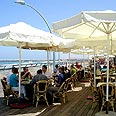
Good life in Tel Aviv – but what about Judaism?
צילום: הילה טוב
No longer a Jewish city?
Op-ed: Founders of Tel Aviv warned us about danger of losing city's Jewish character
The year 2010 was an excellent year for Tel Aviv, as far as skyrocketing vacation prices at city hotels and other statistical summaries are concerned. Foreign media teams walked around the city en masse and lavished the kinds of compliments on it that must have made municipal leaders in Paris, Berlin, and New York jealous.
The Lonely Planet guide wrote this summer that "Tel Aviv is the total flipside of Jerusalem, a modern Sin City on the sea rather than an ancient Holy City on a hill. Hedonism is the one religion that unites its inhabitants. There are more bars than synagogues, God is a DJ and everyone’s body is a temple."
Tel Aviv Mayor Ron Huldai has not protested this compliment to this day, which may explain why religious Israelis have been deserting the city over the past decade. Tel Aviv's fate may have been sealed when former Mayor Shlomo Lahat characterized it as "the city that never stops," thereby officially declaring its aspiration to become secular and meet the challenge of cultural assimilation.
In a proper Jewish city, breaks are part of the municipal essence. People go to pray three times a day, businesses and restaurants shut down for one day of the week, and once a year people even stop eating.
When Meir Dizengoff and his comrades established Tel Aviv, some 102 years ago, they were not plotting to deviate from this ancient tradition. In the recently published Shabbat Book by Yonadav Kaplon we read that during the first mayor's era, people who would publically desecrate the Shabbat were slapped with a fine. Even the watering of private backyards was forbidden.
"Anyone who openly desecrates the soul of the nation on Shabbat will be considered a traitor to his people," said Dizengoff when Tel Aviv was still a small town. "If we do not stand up to this troubling development at once, we shall face the danger of our beloved city turning into a city of merchants and commerce similar to all other Mideastern towns, thereby leaving no trace of the spirit of its founders."
- Follow Ynetnews on Facebook










